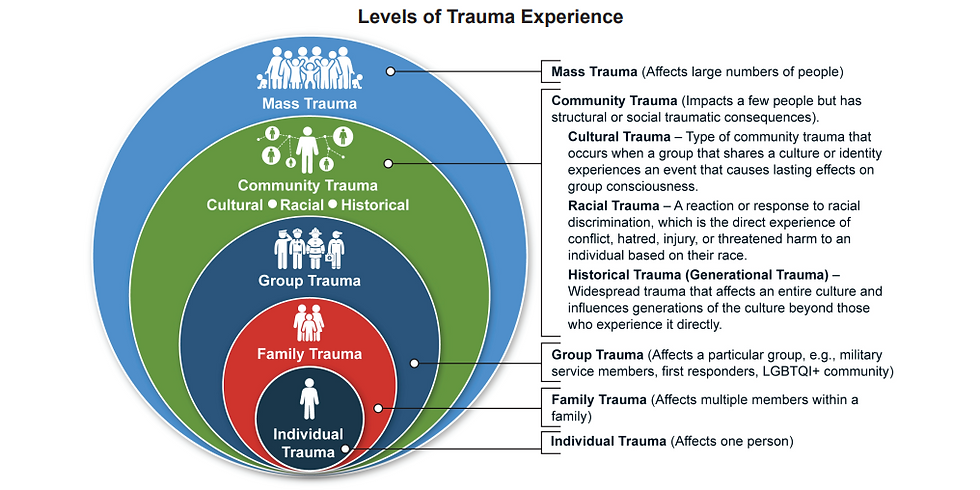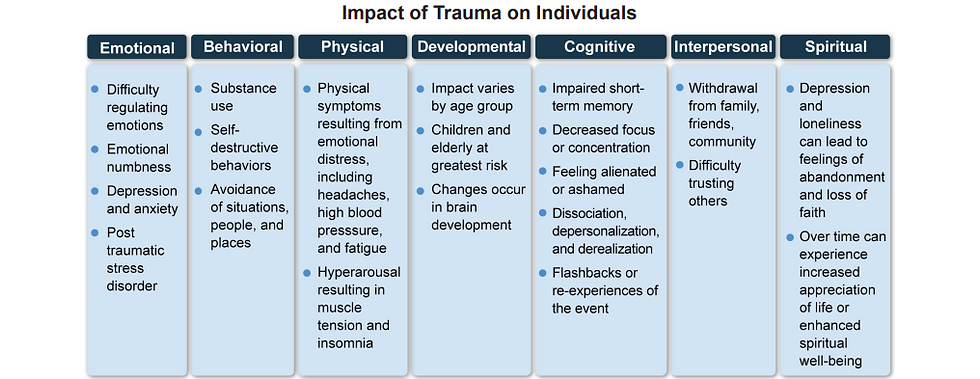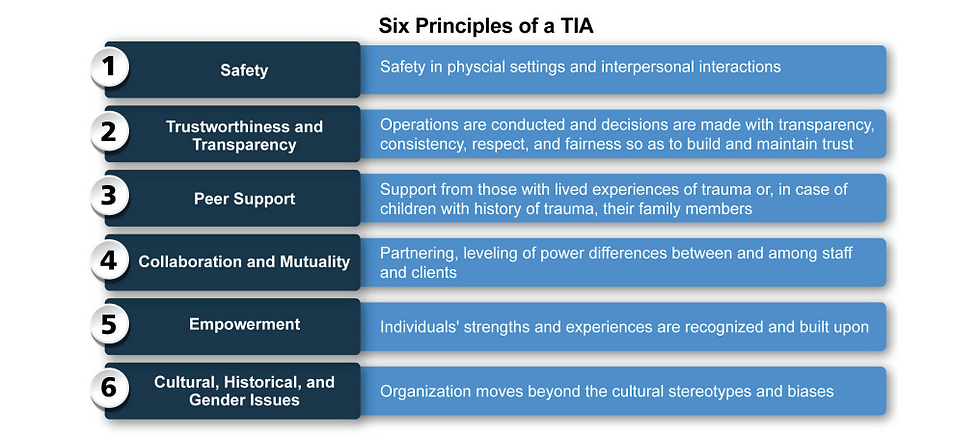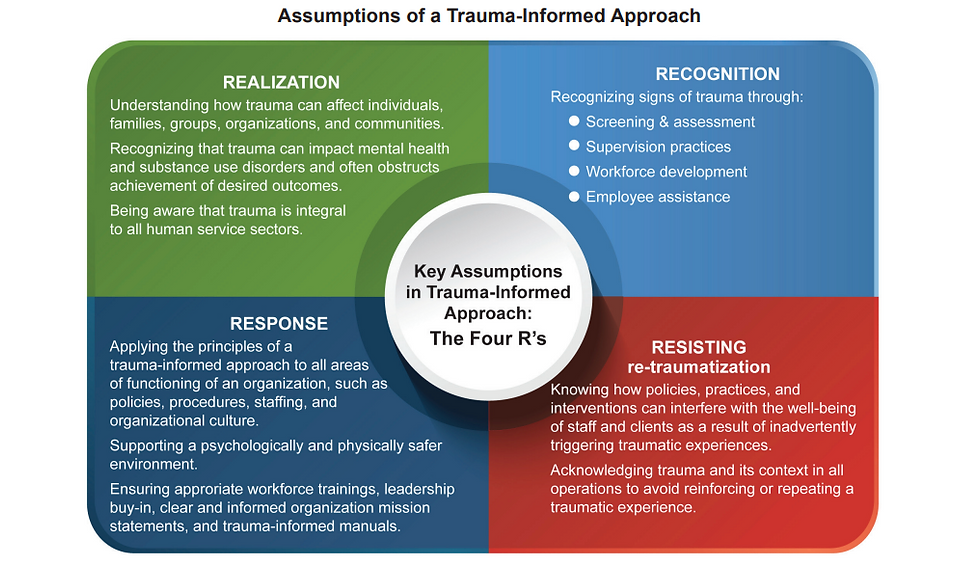The Importance of Trauma Informed Care in Counseling Private Practices
- Quinton Neighbors

- Jan 22, 2024
- 5 min read

Trauma can have a significant impact on an individual's mental health, and it is crucial for counselors in private practices to provide trauma-informed care. Trauma-informed care is an approach that recognizes the prevalence of trauma and its effects on individuals. It emphasizes creating a safe and supportive environment, promoting healing and recovery, and avoiding re-traumatization. By understanding trauma-informed care, counselors can better meet the needs of their clients and provide effective treatment.

The impact of trauma on mental health
Trauma can have lasting effects on an individual's mental health. It can lead to symptoms such as anxiety, depression, post-traumatic stress disorder (PTSD), substance abuse, and self-destructive behaviors. These symptoms can significantly impact an individual's daily life and overall well-being. It is essential for counselors to recognize and address the underlying trauma to help their clients heal and move forward.

Why trauma-informed care is crucial in private counseling practices
In private counseling practices, trauma-informed care is crucial for several reasons. Firstly, it allows counselors to create a safe and supportive environment for their clients. This environment encourages open communication, trust, and collaboration between the counselor and the client. It also helps to minimize the risk of re-traumatization, which can occur when individuals feel unsafe or triggered by certain situations or interactions. By providing trauma-informed care, counselors can establish a foundation for effective therapy and promote healing and recovery.
Secondly, trauma-informed care acknowledges the prevalence of trauma and its impact on mental health. It ensures that counselors are trained to recognize and respond to the signs and symptoms of trauma. By incorporating trauma-informed practices into their counseling approach, counselors can provide more effective treatment and support to their clients.
Lastly, trauma-informed care takes into account the holistic needs of the client. It recognizes that trauma affects not only the individual's mental health but also their physical, emotional, and social well-being. By considering these various aspects, counselors can provide comprehensive care that addresses all areas of the client's life. This holistic approach promotes long-term healing and resilience.
The principles of trauma-informed care
Trauma-informed care is guided by several principles that shape its approach. These principles include safety, trustworthiness, choice, collaboration, and empowerment. By incorporating these principles into their counseling practices, counselors can create a therapeutic environment that fosters healing and growth.

4 r's of trauma informed care
In trauma-informed care, the 4 R's are essential concepts that guide the therapeutic process. These 4 R's are Realize, Recognize, Respond, and Resist re-traumatization.

Implementing trauma-informed care in private counseling practices
To effectively implement trauma-informed care in private counseling practices, counselors must consider various aspects of their practice, including marketing, consultations, sessions, schedules, and billing.
Marketing plays a vital role in the implementation of trauma-informed care in private practice. By engaging the community and promoting education about mental health, marketing efforts raise awareness among potential clients, encouraging them to seek effective treatment. Trauma-informed marketing serves as a liaison, aiming to increase access to quality mental health services. Collaboration within the mental health provider community is always preferable to competition.
In consultations, it is important for counselors to conduct thorough assessments to identify any trauma history or triggers that may impact the client's treatment. This includes asking open-ended questions, actively listening, and creating a safe space for the client to share their experiences. Effective clients to therapist matching are also crucial for long-term treatment success in trauma-informed care. It involves considering factors such as therapist expertise, personality compatibility, and cultural sensitivity.
In counseling, sessions serve as the foundation for other practices. Trauma-informed therapy encompasses a wide range of treatment options, including:
- Trauma-Focused Cognitive Therapy
- Mindfulness-Based Cognitive Therapy
- Prolonged Exposure Therapy
- Dialectical Behavioral Therapy
- Humanistic & Experiential Therapy
- Somatic Therapy
- Polyvagal Therapy
- Psychodynamic Therapy
- Psychodrama
- Internal Family Systems
These various approaches contribute to the effectiveness and diversity of trauma-informed therapy.
In scheduling, consistency is key for clients and therapist longevity. Trauma can disrupt an individual's sense of stability and routine, so providing a consistent schedule can help promote a sense of safety and predictability. This may involve setting regular appointment times, maintaining clear communication about any changes, and being flexible when unexpected circumstances arise.
Trauma-informed care also extends to the billing process. Financial distress can be a significant stressors for individuals who have experienced trauma, so it is important for counselors to be sensitive and flexible in their billing practices. This may include offering reasonable sliding-scale fees, accepting insurance, constant timely billing, or providing information about community resources for financial assistance. By addressing financial concerns, counselors can help alleviate additional stressors that may impede the client's healing process.
Benefits of trauma-informed care for clients and therapists
Trauma-informed care offers several benefits for both clients and therapists in private counseling practices. For clients, trauma-informed care provides a safe and supportive environment for healing and recovery. It acknowledges the impact of trauma on mental health and ensures that their needs are met holistically. By receiving trauma-informed care, clients can experience improved mental health outcomes, increased resilience, and a greater sense of empowerment.
For therapists, trauma-informed care allows for more effective and fulfilling practice. By incorporating trauma-informed principles and practices into their work, therapists can better connect with their clients and provide targeted treatment. This can lead to increased job satisfaction, improved therapeutic outcomes, and a deeper understanding of trauma and its effects.
Additionally, trauma-informed care in billing can contribute to the financial well-being of both clients and therapists. By being sensitive to financial concerns and offering flexible payment options, therapists can ensure that clients can access the care they need without additional stress. This can also help therapists maintain a stable client base and reduce financial burdens on their practice.
Challenges and considerations in adopting trauma-informed care
While trauma-informed care offers numerous benefits, there are also challenges and considerations in adopting this approach. One of the main challenges is the need for ongoing training and education. Trauma-informed care requires counselors to stay updated on the latest research, therapies, and best practices in trauma treatment. This requires a commitment to professional development and continuous learning.
Another challenge is the potential for vicarious trauma or burnout among therapists. Working with clients who have experienced trauma can be emotionally demanding and can impact the therapist's own well-being. It is crucial for therapists to practice self-care, seek peer support, and have access to supervision or consultation to prevent burnout and ensure their own mental health.
Lastly, the adoption of trauma-informed care may require changes to existing systems and practices within a private counseling practice. This includes implementing new policies, training staff members, and creating a trauma-informed culture. It may take time and effort to fully integrate trauma-informed care into all aspects of the practice, but the benefits are well worth the investment.
Conclusion: The future of trauma-informed care in counseling private practices
Trauma-informed care is a critical approach for counselors in private practices to provide effective treatment and support to clients who have experienced trauma. By understanding the impact of trauma on mental health and incorporating trauma-informed principles and practices into their work, counselors can create a safe and supportive environment for healing and recovery.
The future of trauma-informed care in counseling private practices is promising. As more research is conducted and awareness increases, the importance of trauma-informed care is becoming widely recognized. It is essential for counselors to continue to educate themselves, advocate for trauma-informed practices, and support the well-being of both clients and therapists.
By prioritizing trauma-informed care, private counseling practices can contribute to the overall mental health and well-being of individuals who have experienced trauma. Through compassion, empathy, and evidence-based treatment, counselors can make a significant difference in the lives of their clients and help them on their journey to healing and resilience.
CTA: If you or someone you know has experienced trauma and is seeking support, consider reaching out to a trauma-informed counselor in a private practice near you. Remember, healing is possible, and you don't have to face it alone. visit www.neighborscounseling.com/therapist to learn more about our therapist.


